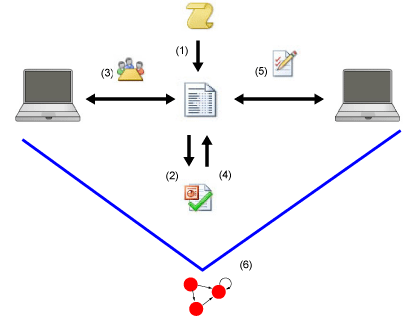by Pablo Giambiagi, Olaf Owe, Anders P. Ravn and Gerardo Schneider
The 'COSoDIS' project - Contract-Oriented Software Development for Internet Services - is developing novel approaches to implementing and reasoning about contracts in service-oriented architectures (SOA). The rationale is that system developers benefit from abstraction mechanisms in working with these architectures. Therefore the goal is to design and test system modelling and programming language tools to empower SOA developers to deploy highly dynamic, negotiable and monitorable Internet services.
As recently as several years ago, technology gurus predicted that the next big trend in software system development would be service-oriented architecture: that is, a successful integration of loosely coupled services belonging to different organisations, sometimes competing but on specific tasks collaborating, would storm the world. This would create a myriad of new business opportunities, enabling the formation of virtual organisations in which small and medium-sized enterprises would join forces to thrive in an increasingly competitive global market. The dream lives on, and the industry is pouring resources into developing and deploying Web services. Yet the degree of integration achieved between different organisations remains low. Collaboration presumes mutual trust, and wherever trust is not considered sufficient, business people turn to contracts as a mechanism to reduce risk. In other words, for the SOA to deliver its promised advantages, developers need cost-effective contract management solutions.
- The main problems and open issues identified for supporting Web services development are the following:
- Formal definition of generic contracts: currently, no unified system of syntax and semantics exists for contracts (in particular for quality of service (QoS) and security).
- Negotiable and monitorable contracts: a contract must be negotiated until both parties agree on its final form, and it must be monitorable in the sense that there must be a way to detect violations. Current programming languages provide little support for negotiable and monitorable contracts.
- Combination of object-orientation and concurrency models based on asynchronous message-passing. The shared-state concurrency model is not suitable for Web service development.
- Integration of XML into a host language, reducing the distance between XML and object data models.
- Harmonious coexistence at the language level of real-time and inheritance mechanisms.
- Verification of contract properties: the integration of contracts in a programming language should be accompanied by the ability to guarantee essential properties. Guaranteeing the non-violation of contracts can be done in (at least) four different ways: (a) with runtime enforcement (eg through monitors); (b) by construction (eg through low-level language mechanisms); (c) with static program analysis techniques; or (d) through model checking.
None of the above can be used as a universal tool; they must be combined.

Some contracts may be seen as wrappers that 'envelop' the code/object under the scope of the contract. Firewalls, for instance, may be seen as a kind of monitor of the contract between a machine and the external applications wanting to run on that machine. It would be interesting to investigate a language primitive to create wrapped objects that are correct by construction.
Contracts for QoS and security could also be modelled as first-class entities using a 'behavioural' approach, through interfaces. In order to tackle time constraints (related to QoS), such interfaces need also to incorporate time.
Finding languages or notations for describing timing behaviour and requirements is easy: the real challenges are in analysis. Besides syntactic extensions, the language needs to have time semantic extensions in order to allow extraction of a timed model, eg a timed automaton. This model may be checked with existing tools such as Kronos or Uppaal, while other properties may instead be proven correct by construction (eg wrappers).
In practice, many properties can only be validated through runtime approaches. A promising direction is to develop techniques for constructing a runtime monitor from a contract, which will be used to enforce its non-violation (cf ongoing work with Java Modeling Language and Spec#).
In summary, our aim is to develop language-based solutions to address the above problems through the formalization of contracts as enriched behavioural interfaces, and the design of appropriate abstraction mechanisms that guide the developer in the production of contract-aware applications.
The COSoDIS project is a Nordic project funded by the Nordunet3 committee. The partners involved are the University of Oslo (Norway), Aalborg University (Denmark) and SICS (Sweden).
Link:
http://www.ifi.uio.no/cosodis/
Please contact:
Gerardo Schneider, University of Oslo, Norway
Tel: +47 22 85 29 71
E-mail: gerardo![]() ifi.uio.no
ifi.uio.no
http://folk.uio.no/gerardo/









